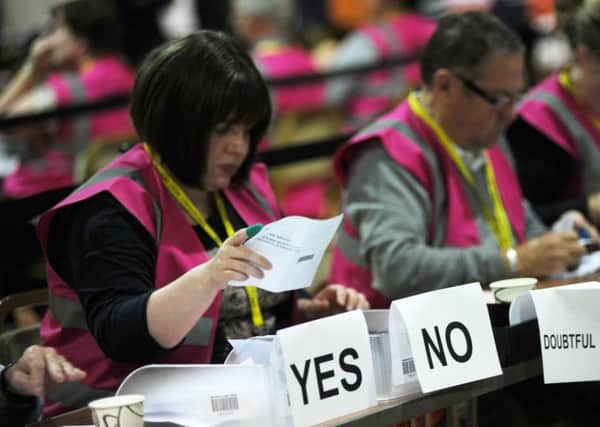Indyref2: What do polls say since Sturgeon's announcement?


Since her speech on Monday commentators have been trotting out familiar arguments on both sides of the constitutional question.
The polls too, have taken on something of a recognisable pattern, with both the Yes and No teams pouring over the most recent data.
Advertisement
Hide AdAdvertisement
Hide AdWith polls coming out before and after Nicola Sturgeon’s landmark press conference we take a deeper look at what the numbers might mean before the next referendum.
Cheers for the No side
Whatever Better Together Part 2 decides to call itself, that nascent campaign was given a boost by a poll in today’s Times.
A YouGov survey showed that support for staying in the union had increased since the referendum of 2014.
That might embolden Theresa May’s government to reject outright the proposal put forward by Nicola Sturgeon to be transferred the power to hold a new vote.
Any poll that shows the lack of enthusiasm for a separate Scotland can be cited by Unionists to argue there is no justification for a re-rerun of the referendum.
Conversely, news that the Union remains the most popular option for Scottish voters could spur the Tories to allow the new poll to take place.
Confident that the No side could win, a smart unionist position might be to take on the referendum challenge, settling the constitutional question for a (real) generation and ridding the SNP of a formidable leader in Nicola Sturgeon in one fell swoop.
The confusing polling picture, however, might see the Conservatives learn the lesson of Brexit and decide that despite any potential backlash, the best option is to continue to stonewall the SNP’s request for another vote.
On the other hand...
Advertisement
Hide AdAdvertisement
Hide AdThe SNP was buoyed by a Scottish Social Attitudes survey published today.
The annual report from the social researchers found 46 per cent of the population backed a separate Scotland.
That compares with 23 per cent in 2012 ahead of the first referendum on Scottish independence, consistent with previous polling on the issue.
With independence support thought to be around a third as a general rule, the Yes campaign’s achievement of 45 per cent of the vote was a significant step forward for nationalists despite their defeat.
Independence supporters will be cautiously optimistic that they can convince more people that separation is the best option following the surprise Brexit decision.
